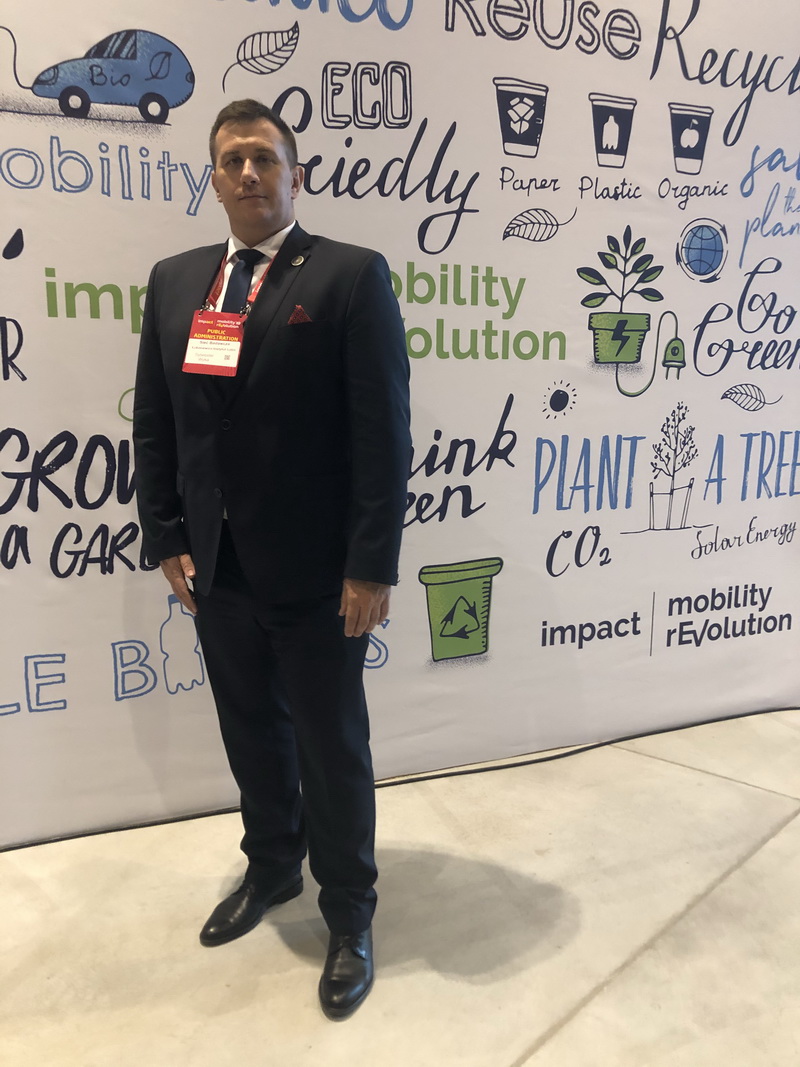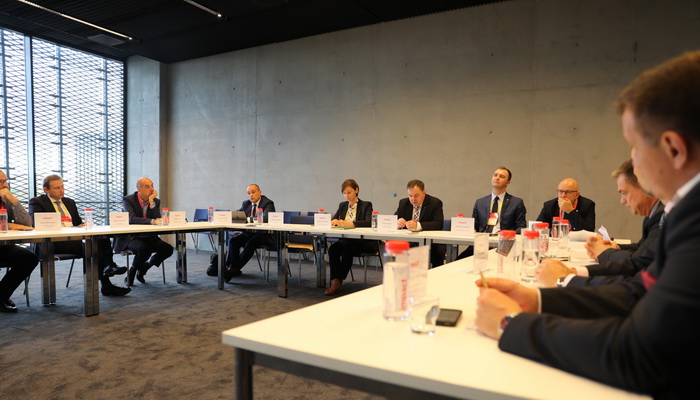On 9-10 October 2019 in the International Congress Centre in Katowice the Impact mobility rEVolution’19 conference took place. The event was a place of debate on zero-emission drives, autonomous transport, solutions for smart city and having a positive impact on the environment.
Impact mobility brought together representatives of companies and institutions related to the technology, automotive and logistics sector, as well as politicians and managers from Poland and Central and Eastern Europe who are influential for the industry.
The ŁUKASIEWICZ – Institute of Aviation was represented at the event by Deputy General Director Sylwester Wyka who took part in a roundtable meeting devoted to the future of autonomous transport.
Other participants in the debate were: Marcin Ślęzak (leader) – Director of the Motor Transport Institute, Michał Wiekiera – Polish Automotive Industry Association, Andrzej Ziółkowski – President of the Office of Technical Inspection, Paweł Szymański – Director of the Department of Unmanned Aircraft (ULC), Małgorzata Darowska – Plenipotentiary of the Minister of Infrastructure for Transport and Tourism, Paweł Szymański – Director of the Department of Unmanned Aerial Vehicles (ULC), Małgorzata Darowska – Plenipotentiary of the Minister of Infrastructure for Transport and Tourism. Marcin Kraska – Vice-President of the Łukasiewicz Center for Research and Development, Paweł Silbert – President of Jaworzno and Artur Marciniszyn.
The discussion covered the main challenges currently facing market participants, i.e. certification, legislation, data storage and sharing, system security, cyber-security, training and education of users, data privacy and ethical issues.

In his speech, Sylwester Wyka, Deputy General Director of the ŁUKASIEWICZ – Institute of Aviation, emphasized the importance of social acceptance and ethical issues in the further development of transport automation technologies. He also pointed to the previous experience of the Institute in the face of difficulties in the implementation of autonomous flights of unmanned aircrafts in Poland. Engineers of the ŁUKASIEWICZ – Institute of Aviation have extensive experience in BSP tests which were carried out in the state of Nevada, USA.
According to Paweł Szymański, Director of the Unmanned Aircraft Department, the regulations introduced this year by the Civil Aviation Authority will enable the implementation of such flights in Poland.
The President of the Office of Technical Inspection, Andrzej Ziółkowski, pointed out in his speech that as a certifying institution they are interested in drones that fly in potentially explosive atmospheres (ATS) – currently there are no such solutions on the market.
Małgorzata Darowska, plenipotentiary of the Minister of Infrastructure for Unmanned Aerial Vehicles, emphasized the importance of the Central European Drones Demonstrator (CEDD), which is a key element in the implementation of the national U-Space system. The aim of CEDD is, among other things, to create conditions for the development of technologies using BSP by providing test areas, including autonomous ones, enabling technology acceleration and testing solutions at various levels of advancement. According to Małgorzata Darowska, it will also be important to continue and support works related to the development of airspace management systems (CAT system – PAŻP). The Ministry of Infrastructure is also preparing a report on autonomous traffic, the basic assumptions of which were presented during the debate.
Marcin Kraska, Vice-President of the Łukasiewicz Center for Research and Development, pointed out that technology will be ahead of the law – but it is important for regulators to react early enough to emerging changes. The BSP market also faces the challenge of developing appropriate safety systems (the Chinese have shown how easy it is to hack Tesla).
The President of Jaworzno, Paweł Silbert, observed a decrease in the enthusiasm of government agencies for the development of autonomous technologies. He also confirmed Marcin Kraski’s thesis that legal regulations are created only for existing products and services. In his opinion, it is important to identify and occupy niches that are worth developing in the autonomous technologies segment.
The debate also featured a strong voice of representatives of the automotive industry.
The roundtable meeting was led by the Director of the Motor Transport Institute, Marcin Ślęzak, who presented research projects involving ITS (ADrive project – simulation tests of AV vehicles, TRUSTONOMY project – human-vehicle communication, AV-PL-ROAD project – definition of a desirable and possible model of road transport autonomy in Poland). Michał Wiekiera from the Polish Automotive Industry Association drew attention to a legal problem concerning basic regulations (e.g. common electricity in an underground car park). Artur Marciniszyn also pointed to the lack of appropriate regulations – currently in Poland there are no regulations allowing to use unmanned vehicles. There are also no specific solutions in other European countries (e.g. Sweden).
The participants agreed with Marcin Ślęzak’s thesis at the beginning of the discussion on the need for complementary actions and exchange of information between individual ministries and government agencies. As already stressed in the conclusion, further actions and specific solutions (sectoral programmes, financing) are needed to develop autonomy in Poland.












